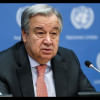Myanmar militarising Rohingya villages
Myanmar is militarising Rakhine Sate at an alarming pace as it is building security force bases and bulldozing Rohingya villages, making the voluntary, safe and dignified return of Rohingya refugees an even more distant prospect, Amnesty International said yesterday.
The atrocities by the Myanmar security forces drove out some 700,000 Rohingyas to Bangladesh since August 25 last year. During the operations, Rohingya villages were burnt to the ground, while thousands were allegedly killed and women raped.
The UN has denounced Myanmar's “brutal security operation” against Rohingyas in Rakhine State as a “textbook example of ethnic cleansing.
Meanwhile, Bangladesh and Myanmar have signed a deal on Rohingya repatriation, though it has not begun yet.
Against this backdrop, Amnesty International in its new briefing “Remaking Rakhine State” yesterday said eyewitnesses and satellite imagery found how flattening of Rohingya villages and new construction have intensified since January in areas where hundreds of thousands fled the military's campaign of ethnic cleansing.
New roads and structures are being built over burned Rohingya villages and land.
“What we are seeing in Rakhine State is a land grab by the military on a dramatic scale. New bases are being erected to house the very same security forces that have committed crimes against humanity against Rohingya,” said Tirana Hassan, Amnesty International's crisis response director.
“This makes the voluntary, safe and dignified return of Rohingya refugees an even more distant prospect. Not only are their homes gone, but the new construction is entrenching the already dehumanising discrimination they have faced in Myanmar.”
The global rights watchdog said although the violence in Rakhine State has subsided, the campaign to drive Rohingya out of their homeland -- and ensure they cannot return -- continues but has taken on new forms.
“The bulldozing of entire villages is incredibly worrying. Myanmar's authorities are erasing evidence of crimes against humanity, making any future attempts to hold those responsible to account extremely difficult,” said Hassan.
AI said Myanmar authorities have launched an operation to rapidly expand security infrastructure across Rakhine State, including bases to house the military and Border Guard Police, as well as helipads.
Satellite imagery reveals how, in just a few months, new bases have been erected over torched Rohingya land, with whole villages and even nearby forests cleared to make room, it said.
The village of Ah Htet Nan Yar was burned to the ground during the early days of the post-25 August violence in 2017. By January 2018, a new road has been built directly on land where Rohingya homes had stood.
AI's analysis of satellite imagery has confirmed that at least three new security bases are being built in northern Rakhine State -- two in Maungdaw Township and one in Buthidaung Township. Construction appears to have started in January.
The largest of the new bases is in the village of Ah Lel Chaung in Buthidaung Township, where eyewitnesses said that the military forcibly evicted Rohingya people from certain areas to make way for construction. Many of the villagers saw no option but to flee into Bangladesh, AI added.
“People are in a panic. No one wants to stay because they are afraid of more violence against them,” said a 31-year-old man who fled to Bangladesh in January when the military erected a new fence and security post close to his village.
Meanwhile, the UN Special Rapporteur on the situation of human rights in Myanmar, Yanghee Lee, told the Human Rights Council yesterday that she was increasingly of the opinion that the events in Rakhine State bear the hallmarks of genocide.
Delivering her report to the Council in Geneva, Lee said that to date accountability for the crimes committed in Rakhine State following August 25 last year, and October 9, 2016, was elusive, adding that this must now be the focus of the international community's efforts to bring long-lasting peace, stability and democratisation to Myanmar.
“This must be aimed at the individuals who gave the orders and carried out violations against individuals and entire ethnic and religious groups,” said Lee. “The government leadership who did nothing to intervene, stop, or condemn these acts must also be held accountable.”
Lee, also the UN independent investigator, called for a thorough, impartial and credible investigation to be conducted without delay and perpetrators to be held responsible for the alleged crimes that were committed in Rakhine State since October 9 in 2016 and August 25 last year, and for the violations that continue today.
She called for the establishment of a UN structure, based in Cox's Bazar in Bangladesh, for a duration of three years to investigate, document, collect, consolidate, map, and analyze evidence of human rights violations and abuses.
“The external review should assess whether the UN and international community could have prevented or managed the situation differently that occurred regarding the Rohingya and in Rakhine State, and make recommendations for accountability if appropriate,” she said.
Lee, whose access to Myanmar was denied last year, also expressed concerns that as the world's attention was drawn to the recent crisis in Rakhine State, scant attention had been afforded to continued and escalating violence in Kachin, Shan and other conflict affected states in the country.
She said against this background, the peace process appeared to be losing its momentum.
Lee said she hoped to make official visits to India and China as part of her preparation to report to the General Assembly later this year, and said she remained hopeful that the Myanmar government would revisit its decision and grant her access.

 For all latest news, follow The Daily Star's Google News channel.
For all latest news, follow The Daily Star's Google News channel. 








Comments